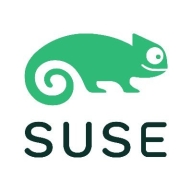

SUSE Linux Enterprise and Rocky Linux both compete in the enterprise Linux distribution category. SUSE Linux Enterprise appears to have an edge in server management and enterprise support, particularly with SAP HANA and Oracle, while Rocky Linux offers strong community support and cost-effectiveness, appealing to cost-sensitive users.
Features: SUSE Linux Enterprise includes an offline repository, ease of use with YaST for server management, and high availability. It supports SAP HANA and provides robust Oracle support. Rocky Linux features stability and compatibility with RHEL, strong community support, and clustering capabilities.
Room for Improvement: SUSE Linux Enterprise could improve in package management, security compliance, and cloud integration. The pricing is considered high by some users, who also suggest enhancing the GUI and documentation. Rocky Linux needs better Windows integration, faster updates, and clearer market communication.
Ease of Deployment and Customer Service: SUSE Linux Enterprise offers robust deployment across cloud and on-prem environments, with comprehensive support and responsive customer service. It has a learning curve due to SUSE-specific tools. Rocky Linux offers simple setup and effective hybrid deployments, relying on community forums for support, making it attractive for cost-sensitive deployments.
Pricing and ROI: SUSE Linux Enterprise has higher costs due to subscription and support services but provides good ROI with features like scalability and stability, especially in SAP environments. Rocky Linux is primarily free or low-cost, offering excellent value by reducing operational expenses compared to paid enterprise distributions like Red Hat.
When it comes to return on investment, a lot of money is saved since we moved from a purchased license to the open source provided by Rocky Linux.
ROI has been good as we have significant open source community involvement.
I have seen a return on investment since there was definitely money saved at the time due to the lack of need for licensing since Rocky is available openly.
I have seen a return on investment by switching our clusters from on-prem to Azure public cloud, using our same Bring Your Own Licenses, which saved costs on licensing.
The support level is extraordinary, providing on-time assistance.
We have not yet needed to contact a vendor regarding Rocky Linux.
Even if we raise a support ticket, we receive a resolution or a reply from the team within two business days.
SUSE Linux Enterprise provides a stable, secure, and well-supported platform for enterprise workloads, with powerful management tools and robust support for clustering, cloud, and containers.
The customer support is good; whenever we have opened a case, they have provided detailed explanations of the issues and resolutions.
I rate the customer service 10 out of 10 because SUSE has 24/7 availability support, extended support, security, multi-Linux distribution support, upgradation, and everything is user-friendly.
Even if the server is not responding and we want to attach the volume on another instance or a temporary instance, it is very easy and straightforward with no hiccups.
It has handled growth or changing needs well.
The scalability is quite good, though there are some issues with Rocky Linux.
Its scalability is quite good since we are using Azure, which allows us to easily scale up or down our resources as needed.
SUSE Linux Enterprise is widely recognized for its strong scalability, making it suitable for organizations of all sizes, from small businesses to global enterprises.
Rocky Linux is stable, scalable, and it is very much easier to use.
Rocky Linux is stable.
When HANA is utilized by many applications, I notice that while utilization does increase, we have never faced lagging or server unresponsiveness.
I would rate stability for SUSE Linux Enterprise an eight out of ten.
It is based on customer requirements, as they might want to use Rocky Linux or Ubuntu, depending on their needs.
Rocky Linux could be improved by having more integration with Kubernetes.
Currently, it takes more than one month to release a new package or kernel, so speeding that up would help reduce reported vulnerability remediations.
Security is a top concern, and further strengthening default security policies, simplifying compliance management, and integrating advanced vulnerability management tools would be a valuable improvement.
The software manager was different, making it challenging to install certain applications.
The license we subscribed to should carry over within the same instance family.
We switched to Rocky Linux because of the license price, and in our business, we don't need to have a higher cost as that is not a good idea.
There is no extra cost for a license if we are purchasing Rocky Linux from the AWS Marketplace.
Rocky Linux is free, and I can download it and deploy it in whatever environment I have, whether it be H3C, VMware, or Hyper-V.
Upgrading an instance results in overlapping or double subscription fees.
I would rate pricing for SUSE Linux Enterprise considering one is a high price and ten is a low price.
The licensing cost is a bit high.
Rocky Linux has positively impacted my organization, specifically through cost savings, because we did not have to buy any licenses or extra licenses of other distros, such as Oracle or Red Hat.
For production deployment, Rocky Linux is a great choice because it offers full RHEL compatibility without licensing costs, along with strong community support.
Since migrating to Rocky Linux, I've seen specific outcomes such as improved security because CentOS stopped the project, and security patches aren't being released.
SUSE Linux had a clean user interface, which was a valuable feature for me.
It has a stable and reliable OS.
The LVM is very easy to configure, along with simple disk scanning compared to other systems.
| Product | Market Share (%) |
|---|---|
| Rocky Linux | 13.0% |
| SUSE Linux Enterprise | 5.8% |
| Other | 81.2% |


| Company Size | Count |
|---|---|
| Small Business | 5 |
| Large Enterprise | 14 |
| Company Size | Count |
|---|---|
| Small Business | 8 |
| Midsize Enterprise | 11 |
| Large Enterprise | 22 |
Rocky Linux provides enterprise-grade stability and seamless Red Hat compatibility, coupled with extensive community support. Known for easy setup and minimal maintenance, its open-source nature ensures cost-effectiveness, making it ideal for critical systems.
Rocky Linux is an open-source operating system valued for its compatibility with Red Hat Enterprise Linux, making it an attractive choice for organizations migrating from CentOS. It focuses on stability, security, and long-term support, crucial for critical systems. Users benefit from seamless integration with automation tools and its strong community backing. While it offers ease of setup and package availability, areas like software availability and faster updates need enhancement. The system's UX design supports productivity, with potential improvements in documentation and security integration helping to maintain competitive advantages.
What Are the Key Features?Rocky Linux is widely implemented across numerous industries as a server platform and backend OS, supporting web hosting, big data projects, and cloud infrastructure. Companies in IT environments like Nutanix data centers and high-performance computing choose it for its compatibility with open-source tools, making it favored for automation with Ansible and monitoring through Prometheus.
SUSE Linux Enterprise offers features like YaST for server management, seamless integration with Oracle and SAP, and a robust security setup. Renowned for stability, it efficiently supports workstations, SAP workloads, and cloud migrations across diverse industries.
SUSE Linux Enterprise is known for its lightweight design, high performance, and ease of installation. Its flexible architecture supports extensive documentation and efficient patching. The system uses the BTRFS file system for effective virtualization, and community support is significant. However, challenges include package updates causing conflicts, difficult initial setup and software management, high pricing, and support response times. Improvements in security compliance, cloud integration, hardware compatibility, and documentation are also needed.
What are SUSE Linux Enterprise's important features?
What benefits should users expect from using SUSE Linux Enterprise?
Industries like healthcare and banking use SUSE Linux Enterprise for secure transactions and structured application deployment. It is also a choice for organizations involved in testing, automation, and web development, offering support for SAP HANA integration and facilitating cloud migrations.
We monitor all Operating Systems (OS) for Business reviews to prevent fraudulent reviews and keep review quality high. We do not post reviews by company employees or direct competitors. We validate each review for authenticity via cross-reference with LinkedIn, and personal follow-up with the reviewer when necessary.